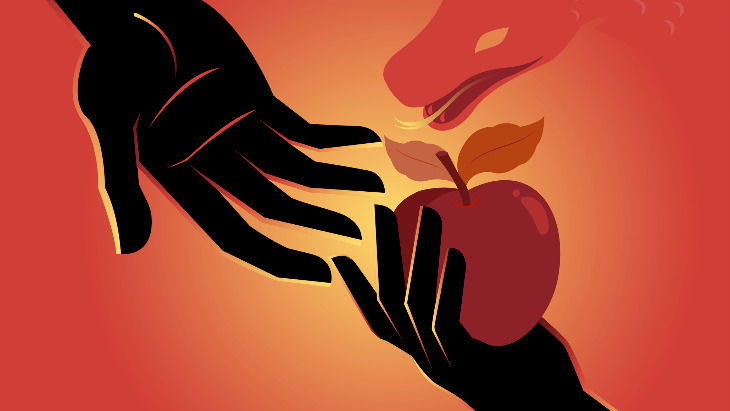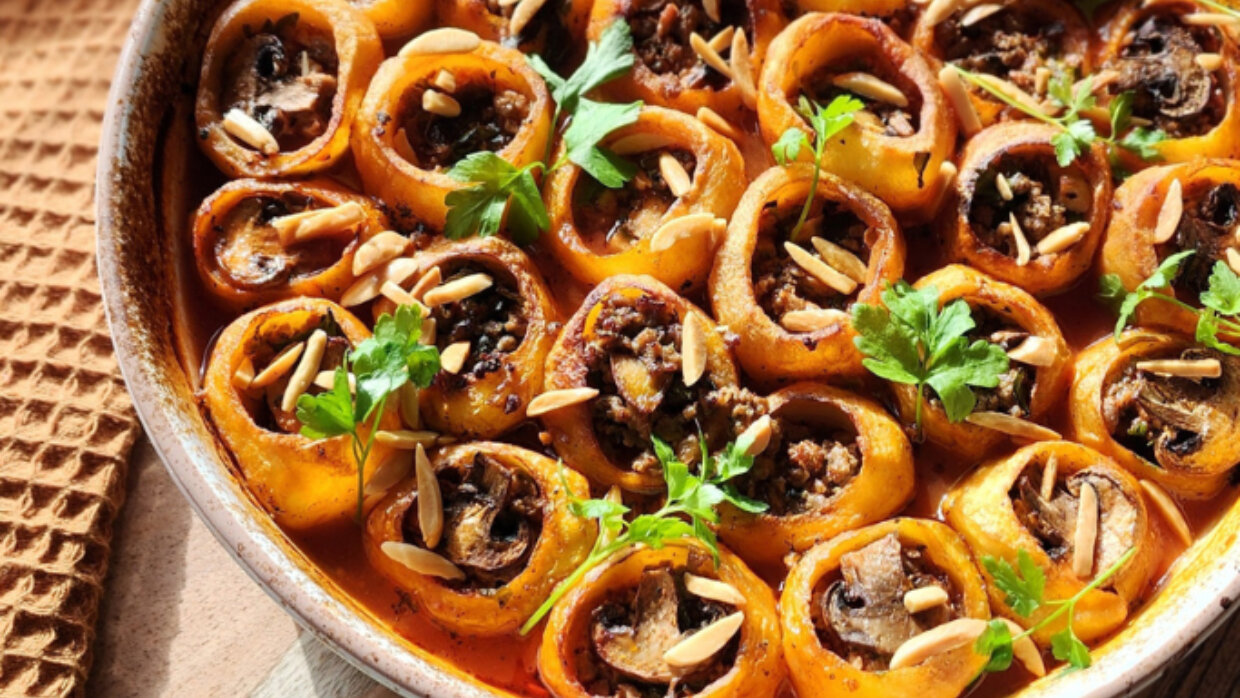Judaism is replete with teachings, from Jewish law to Jewish mysticism, that emphasize the importance of being compassionate towards animals. Just as Judaism cares greatly about how we act towards other humans, it also takes a great interest in how we treat God’s other creations.
Yet we know that Judaism allows for using and killing animals for food, so much so that when people think about kosher food they often think about it being “meat” or “dairy”.
But it wasn’t always that way.
In the beginning of the beginning, in the Garden of Eden, God had a different idea about how people should eat.
And I quote:
“And God said, ‘Behold, I have given you every seed-bearing herb, which is upon the surface of the entire earth, and every tree that has seed bearing fruit; it will be yours for food.” (Genesis 1:29)
Notice the choice of words in this verse: Seed-bearing. Herb. Tree. Fruit.
No burgers, schnitzels or kabobs here. Instead, a vegetarian’s paradise. In fact, noticing the absence of any dairy options on God’s original menu, it seems like the Garden of Eden was the world’s first ever vegan cafe.
Yes, God does eventually deliver “Human Diet 2.0” during the generation of Noah after the Flood, a diet that grants permission to eat animals. So we need to ask, why the change?
According to Rabbi Avraham Yitzhak HaKohen Kook, the first Chief Rabbi of pre-state Israel, this permission was a temporary concession born out of humanity’s spiritual and moral decline (which is why there was a flood in the first place). God was concerned that the desire to eat meat might become so overpowering that it would lead to humans killing other humans for food if they weren’t permitted to kill animals for food.
Rabbi Kook also believed that one day we will return to the original diet that God gave humanity, writing of a time that all people will have the “understanding that one should not take the life of any living, sentient being out of necessity or craving.”
He continues to write:
“Is it possible to conceive that a highly valued moral virtue, which had already existed as a part of the human legacy, should be lost forever? The permission to eat meat, granted after the Flood, was not intended to be the actual practice for all time. For how is it possible for a lofty and enlightened moral condition, once instituted, to vanish (as though it had never been)?” (“Vision of Vegetarianism and Peace”)
Permission to use animals for food was clearly given though, but that permission came with restrictions and limitations. Right away humanity was instructed not to eat the blood of an animal (“For the life of the flesh is in the blood”).
Another passage in the Torah that states “(when) you have the urge to eat meat”, hints at the fact that people are permitted to eat meat only when their desire for it is so powerful that they cannot overcome it. Ideally, though, they should overcome that desire and, as a result, refrain from eating meat.
And eventually, at Mt. Sinai, the Jewish nation was given additional restrictions, primarily regarding which animals they can and cannot consume.
When we look at the list of permitted and prohibited animals, we notice something very interesting:
The animals are all herbivores, the animal kingdom’s version of vegetarianism.
Seems that God is trying to tell us something.
Seems that Judaism favors a diet that doesn’t require us to raise, kill or use animals, as Rabbi Joseph Soloveitchik, modern Jewish philosopher, wrote in his book The Emergence of Ethical Man, “There are definitive vegetarian tendencies in the Torah.”
But there does seem to be a problem with what I’m saying.
Throughout Jewish history we have never seen a great Jewish emphasis on being vegetarian and we’ve never seen a mass movement of Jews living by the “Adam and Eve Diet”. In fact, throughout the thousands of years of our history, Shabbat tables, holiday feasts and cycle-of-life celebrations from Paris to Persia have always been adorned with an array of meat dishes.
At the same time, however, before a steaming pot of beef cholent or a Moroccan chicken dish or a Persian meat stew arrived at the festive family table, a long list of laws, of both Torah and rabbinic origin, needed to be followed in order to not only insure that the animal was slaughtered in a kosher manner, but also that the process of raising the animal, up until the moment of death, was done in a way that was mindful and respectful to the inherent value of the life of the animal, as required by Judaism’s animal welfare laws.
The way I see it, these ancient Jewish laws serve to infuse some of the idealism of the Adam and Eve diet into the Human Diet 2.0. To train us to be aware and sensitive to the taking of another life to sustain one’s own. To instill in the consumers of animals a sense of mindfulness and appreciation.
While I am proud that the Jewish tradition contains these above-mentioned laws and values, it seems that they can only be fully applied in a world that existed before industrialization and globalization. A world based more on local economies, before family farms became factory farms, when the distance from farm to table could often be measured in steps.
But things have changed, both radically and quickly. Overcrowded feedlots have replaced free-range grazing. Cages and pens have replaced the great outdoors. Antibiotics have been introduced to animal feed to keep them from getting sick as a result of their unnatural living conditions. And the use of mass production methods in the slaughterhouses mean that the number of animals slaughtered every hour and every minute has skyrocketed.
And the question that needs to be asked is: Is there room for the ancient Jewish laws of treating animals with compassion in these relatively new industries?
The answer, sadly enough, is no since that requires more time and more space which equates to higher costs and lowered profits which the modern meat, dairy and egg industries are not willing to accept.
So where does this leave us? Where do we go from here?
For the answer to those questions, we may want to look back to the beginning, back to Adam and Eve and the diet God gave them, and see what of that ideal we can bring into our world today.















